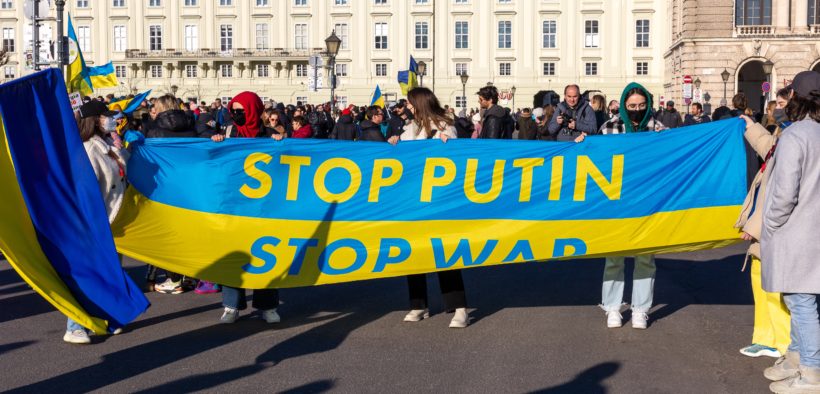Aleppo to Mariupol: Deadly Violations of International Law
Share

Image Credits: @shyshkina on Unsplash (Unsplash License)
A man in a dark blue top and light pants lies dead, a gunshot wound to his head, next to his green bicycle on Yablonska St. in Bucha, Ukraine. In early March, aerial footage recorded by the Ukrainian military shows a convoy of Russian BMD-4 infantry fighting vehicles firing several rounds in the direction of a man walking his bicycle in the precise location where his body was photographed weeks later. The cyclist’s body is one of the 360 bodies found in Bucha, only two of which have been identified as Ukrainian military personnel. More and more personal stories, images, and videos documenting the impact of the war on civilians, like the residents of Bucha, are emerging from towns surrounding Kyiv. In response, the Ukrainian government and the international community are investigating possible instances of war crimes and crimes against humanity. Bucha’s chief regional prosecutor Ruslan Kavchenko is investigating more than 250 cases of individuals killed by gunshot and shrapnel wounds in a war crimes investigation. Ukrainian President Volodymyr Zelensky and U.S. President Joe Biden have referred to the killing of Ukrainians as “genocide.” Genocide is defined in Article 2 of the Convention on the Prevention and Punishment of the Crime of Genocide as an act “committed with intent to destroy, in whole or in part, a national, ethnical, racial, or religious group.” While these allegations have yet to be legally proven in an international or national court, Ukrainians, the Ukrainian government, world leaders, international organizations, and human rights organizations have all called for accountability from Russia.
The Shadow of Syria
Russian death and destruction in Ukraine is a scene unfortunately familiar to Syrians. Russia has politically and militarily supported Bashar al-Assad’s government, which stands accused of a litany of violations of international law. Russia itself has been accused of war crimes in Syria. Yet, there has been no accountability for Russia’s participation in the Syrian civil war that has killed more than 159,774 civilians and displaced 13.3 million Syrians. Radwan Alhomsy, a Syrian activist, condemned Russia’s invasion of Ukraine, saying, “they don’t care about the international community or anything else. We saw that in Syria.” If there had been accountability for Russia’s actions in Syria, it is possible Vladimir Putin would not have been emboldened to attack Ukraine and its citizens, or at least not at the level of a full-scale military invasion, attacking civilians.
In Syria, Russia’s military intervention repeatedly violated international humanitarian law. From September to October 2016, Russian and Syrian air forces conducted an intense and indiscriminate bombing campaign of Aleppo that killed 446 civilians. Russia’s strategy to break down civilian opposition to the government included repeated airstrikes on civilian hospitals, suggesting the attacks were deliberate. The Aleppo bombings violated the Geneva Convention’s protection of civilians and Article 18’s protection of civilian hospitals. Russia’s actions clearly constitute crimes against humanity and war crimes, but it used its influence to avoid real responsibility under international humanitarian law. Both Russia and Syria are not members of the International Criminal Court. However, the UN Security Council has the ability to refer a case involving any state to the ICC. In 2014, Russia used its veto as a permanent member of the Security Council to prevent an ICC investigation of the Syrian conflict. Other states avoided inviting the hostilities of the global power by choosing not to establish a special criminal tribunal or opening cases against Russian personnel in domestic courts.
International Law
Jus in bello, or international humanitarian law, is a body of treaties and customary international law that governs the conduct of warfare. It is guided by the principles of distinction between combatants and civilians, proportionality, and precaution. The Hague Conventions of 1899 and 1907 regulate the means and methods of warfare. Article 22 states: “The right of belligerents to adopt means of injuring the enemy is not unlimited.” The Geneva Convention Relative to the Protection of Civilian Persons in Time of War protects civilians in conflict areas and occupied territories. Certain norms, under customary international law, have ascended to a higher status to be accepted as jus cogens, or a “non-derogable” norm. Crimes of aggression, genocide, crimes against humanity, and war crimes, constitute jus cogens. A violation of jus cogens invites a response from the international community because it is disruptive to the whole of the global order. In these cases, national and international courts have affirmed and extended the jurisdiction of the international community. International action tends to supersede the principle of state sovereignty in situations involving a violation of jus cogens but it remains a contested issue.
The International Criminal Court’s Rome Statute gives the court jurisdiction over cases against individuals accused of crimes of aggression, crimes against humanity, war crimes, and genocide within its member states. Neither Ukraine nor Russia are signatories to the Rome Statute, but Ukraine has accepted ICC jurisdiction. The ICC may investigate and prosecute Russians for any of the crimes under its jurisdiction except for the crime of aggression. Article 15 bis(5) limits the jurisdiction of the Court related to the crime of aggression “when committed by [the] nationals or on [the] territory” of a state not party to the Rome Statute. Russia is not a state party to the ICC.
Russian Violations of International Law
The problem is not the availability of mechanisms of justice, but the factors inhibiting the ability to investigate, prosecute, and convict Russia. First, Russia’s continued status as a leading global power gives it decision-making authority in the international justice system. As the breakdown of relations with a superpower has significant political and economic ramifications, Russia’s status impedes the political will of other states to punish violations of jus in bello or jus cogens. Second, the treaties that prescribe international humanitarian law are voluntary, and Russia is often not a signatory of such treaties, complicating the international response. Third, obtaining sufficient evidence without Russian cooperation is extremely difficult. Members of Russian intelligence and military personnel cannot be arrested in Russia without the consent of the Russian government, which of course, would be very unlikely. Fourth, there is uncertainty as to the application of international humanitarian law. For example, the distinction between combatants and their infrastructure and civilians and civilian infrastructure is often blurred in conflict. Fifth, the conviction of such serious crimes requires allegations to be proven beyond reasonable doubt, which can be very difficult to achieve in a conflict. This is especially true in cases of genocide which require an “intent to destroy, in whole or in part, a national, ethnical, racial or religious group.” Similarly, state leaders and high-ranking officials cannot be convicted without explicit evidence proving their responsibility for the actions of their subordinates. It is doubtful that any high-ranking Russian officials or Russian President Vladimir Putin will ever be brought to justice as long as they remain in power. Finally, the enforcement powers of the international justice system are severely limited by the sovereignty of states over the prosecution of their citizens.
Without any measure of accountability, Russia has adopted its Syria strategy to Ukraine. Intercepted radio traffic indicated that attacks on civilians have become a “standard element of Russian military activity” to reduce resistance. Reported violations of international humanitarian law, specifically crimes against humanity and war crimes as defined in the Rome Statute, include the targeting of civilians and essential civilian infrastructure, mass executions, sexual violence, forced deportations of Ukrainians to Russia, and the indiscriminate use of cluster munitions, thermobaric weapons, and landmines. There may be an easier path to justice because Ukraine has accepted ICC jurisdiction. However, Russia will continue to use its power and leverage to avoid accountability.
Ultimately, it is unlikely that Russia, especially the individuals most responsible for the invasion of Ukraine, will ever be held truly accountable for its actions in Syria and Ukraine. Nonetheless, in international humanitarian law, the process of achieving justice is itself valuable. Crimes are documented and reported. Victims are offered a platform to share their stories. The world is able to understand Russian responsibility for crimes against Syrian and Ukrainian civilians, even if it is not held legally responsible. Impunity emboldens, as observed in the conflicts of Syria and Ukraine. Without the application of international humanitarian law and accountability for mass atrocities, which nation will host the next tragedy?


Want to get involved?
Connect with us! Connect with us!